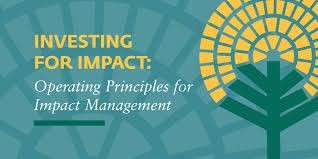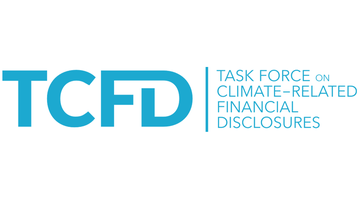Transparency and accountability
Since 2019, FMO committed to two initiatives that foster transparency and accountability of our investment practices related to climate and impact. FMO became a signatory to the Operating Principles for Impact Management and reports in line with the recommendations provided by the Task Force on Climate-Related Financial Disclosures (TCFD).
Operating Principles for Impact Management

In 2019, FMO became a signatory to and advisory board member of the Operating Principles for Impact Management, a global initiative led by the IFC to increase the transparency and accountability of impact investing. The Principles provide a reference point against which the impact management systems of funds and institutions may be assessed. It evaluates impact performance against nine principles around strategic intent, origination & structuring, portfolio management, impact at exit, and disclosure.
FMO already applies most of these principles. Since 2014, our corporate strategy has been aligned with the SDGs and structured along a set of impact goals that are cascaded down to the different investment teams. All our investments need to demonstrate additionality and must adhere to strict environmental and social standards. FMO is also one of the few DFIs to apply attribution (share of financing) to its impact results. In 2019, we strengthened our impact measurement and processes to align more fully with the Principles, through an impact tracking system organized around impact indicators to monitor expected impact and actual performance of each investment.
In 2020, FMO continued operationalizing the changes introduced in 2019. For the first time, we also reported publicly how FMO’s impact management systems, policies and practices, and investment services are managed in line with the Principles, which was verified by a third party. Our disclosure and the limited assurance report are available on our website.
Task Force on Climate-Related Financial Disclosures

Climate action is one of the key pillars of our 2025 strategy. FMO acknowledges the need to demonstrate its responsibility and foresight in considering climate issues. This goes beyond assessing the impact of our activities on the environment as climate change may affect customers vulnerable to the material consequences of and the transition to a low-carbon economy. We strongly believe that improving management of climate-related risks and opportunities is a journey and we continuously improve our practices. Since 2019, we report on our approach to climate following the recommendations provided by the TCFD.
Governance. Climate is an integral part of our mission, vision and business strategy. Having oversight on FMO’s strategy and performance, FMO’s Management Board is responsible for key decisions related to climate, such as revising the strategy or setting ambitions. Furthermore, a Supervisory Board Impact Committee is in place that oversees impact-related topics, including climate.
FMO recognizes it is important to integrate climate change considerations into its operations. Climate-related risks and opportunities are covered across various functions. This ranges from strategy and investment teams preparing business plans to impact teams advising on definitions, policy, and position statements, and monitoring and reporting on performance.
Strategy. In FMO’s 2025 Strategy, climate action has been identified as one of the three top-line Sustainable Development Goals (SDGs) to which FMO can contribute. In practice, this means pursuing a portfolio that delivers positive outcomes on climate mitigation and adaptation. This is aligned with FMO’s Sustainability Policy, published in 2017, which states FMO aims to contribute to financing the transition to a green economy in line with the Paris Agreement.
Climate change poses risks to the economies and markets in which we operate. Our customers’ performance can be impacted by physical risks, such as extreme weather, or policy, legal, technology, market and transition risks arising from the shift to a low-carbon and climate-resilient economy. While this may present investment and business risks for FMO, it also creates opportunities to help customers become more resource and energy efficient, reduce GHG emissions and transition to low-carbon solutions. We continuously assess how this may affect our business over the short, medium, and long term, but our strategy already considers:
Adapting our portfolio: To reduce climate risks and seize opportunities, we aim to align with a 1.5-degree pathway by growing our green portfolio, targeting high impact sub-sectors such as forestry, and specific exclusions of high-emitting projects focusing on, for example, coal and other fossil fuels. We finance green projects in the energy and agricultural sector, provide green credit lines to financial institutions, contribute to green funds and issue green bonds. We further aim to improve the GHG efficiency of our portfolio and finance carbon negative transactions. We continue to refine our strategy to comply with the requirements of the Dutch Climate Agreement;
Mobilizing climate capital: FMO blends and mobilizes climate funds, for example via Climate Investor One, ElectriFI, and the Dutch Fund for Climate and Development. We are also increasing the climate focus in AEF and Building Prospects, and climate is part of the investment strategy of three funds advised on by FMO Investment Management;
Sectoral engagement: We are transparent about our approach to climate and engage other organizations on this topic. As an active member of the Partnership for Carbon Accounting Financials, FMO seeks to create an open-source global carbon accounting standard. We also cooperate with other bilateral and multilateral development banks to harmonize GHG accounting and improve our climate risks and opportunities management. FMO and the Dutch financial sector have pledged to report the footprint of relevant assets as of 2020 and set reduction targets from 2022 onwards through the Dutch Climate Agreement.
Risk management. In 2019, FMO’s risk taxonomy and risk appetite framework were updated to include ESG risk as a risk type with a defined appetite. Additionally, climate change was explicitly added as an external causal factor, and is assessed in FMO’s Internal Capital Adequacy Assessment Process (ICAAP). Driven by recent publications by the DNB and the European Central Bank, FMO is in the process of better integrating climate-related risks into its strategy, risk management framework, and disclosures:
Since 2016, with our Position Statement on Coal and Mining, we decided to not directly finance any coal-based power generation and/or coal mining, and limit our indirect exposure. In 2020, we went one step further and published a draft Position Statement on Phasing out Fossil Fuels in Direct Investments. Herein we commit to not engage in direct financing of exploration and extraction of fossil fuels, Heavy Fuel Oil/Life Cycle Oil projects/transmission, as well as production, storage and transportation of fossil fuels for non-power generation, and set socio-economic transition criteria for gas-based power generation, distributed energy and transmission & distribution. This is in line with the climate statement made by EDFIs in November 2020.
For all investments, we identify, assess and monitor ESG risks through our risk, compliance and operational processes. As climate change risks are becoming more prominent, we discuss how to improve mitigation and resilience with our customers. In case of agriculture projects, for example, climate risk consideration is inherent to our ESG assessment (e.g. impact on ecosystems and water resources, soil cover or micro-dripping for adaptation). This includes biodiversity assessments. FMO also is a member of the Partnership for Biodiversity Accounting for financials to improve measurement of biodiversity risk and impacts. We are currently working on formally integrating climate risk considerations at contracting and monitoring. For instance, the assessment of physical risks and exposure in energy and FI projects will be formalized in our due diligence process. Such discussions will also be held in the boardroom of our customers. FMO can still improve the way it quantifies risks, but we believe that closer relationships with the customers will raise awareness and allow us to manage risks together;
Managing opportunities: While discussing climate-related risks with our customers, we also explore ways to create new opportunities. Moreover, we identify Green-labelled investments and steer our portfolio towards a higher share of such transactions. We set up a process based on our Green definition and eligibility criteria, and internal verification and approval to obtain the label. Green performance at portfolio level is monitored monthly.
Metrics and targets. In line with our ambition to enhance green investments, we track climate-related metrics. The results of the following metrics are disclosed in the Performance chapter:
Green-labelled investments: We steer our portfolio towards SDG 13. In 2020, we set an annual target on Green-labelled investments of at least 34% of annual production to influence customer selection, project preparation and investment decisions;
Avoided GHG emissions: Since 2015, FMO measures its avoided emissions to reflect its activities in transitioning towards a low-carbon economy. In 2020, FMO changed its methodology to align with the new PCAF Global Standard;
Absolute emissions from FMO’s own operations and FMO investments: In the past, we reported on FMO’s own GHG emissions scope 1 and 2, as well as part of scope 3 emissions related to staff travel. However, as a bank, the largest footprint lies within our portfolio. In 2020, we disclose such information for the first time. As part of the Joint Impact Model, a GHG accounting approach and tooling was developed to measure absolute emissions from our investments, which we plan to use for aligning our portfolio with the 1.5-degree pathway. Our methodology has been aligned as much as possible with the new PCAF Global Standard;
Sequestered emissions: In 2020, together with CDC, FinnFund and Swedfund FMO developed the Forest Carbon Sequestration tool (FRESCOS) in order to measure carbon emissions and removals of forestry and agroforestry projects.
Next steps. Together with EDFI members, we committed to adopting the recommendations of the TCFD and further embed climate risk management at every level of FMO. In 2021, a cross-departmental project will start to build a framework to better embed climate-related and ESG risks into FMO’s risk framework. In the coming years, we aim to formalize the management of climate-related issues in line with TCFD's and ECB's expectations.